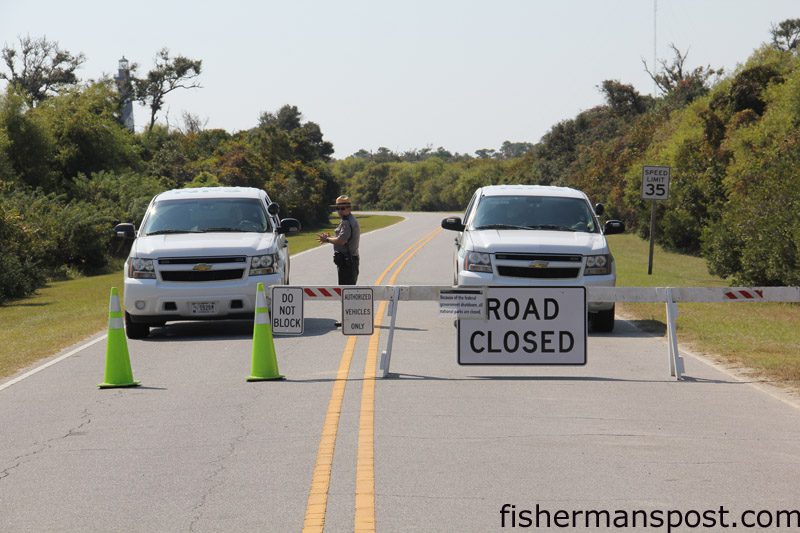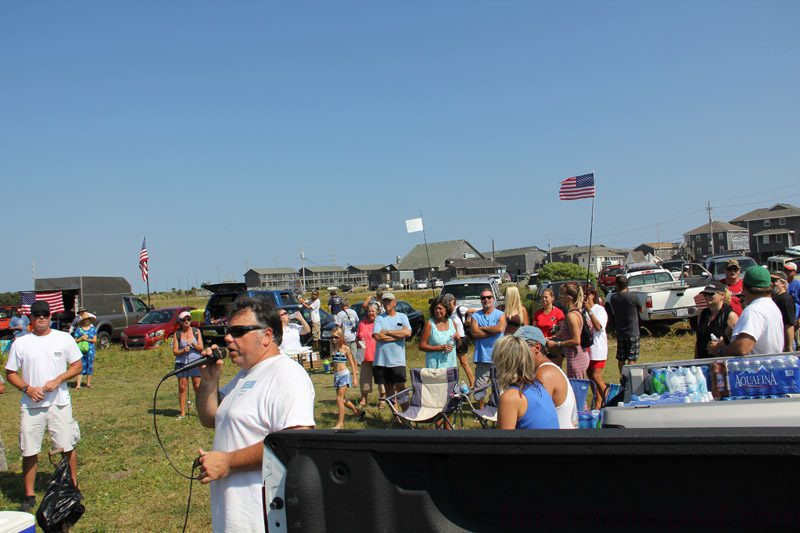Tidelines – October 10, 2013

National Park Service trucks and guards block the way to the 4-wheel drive access at Cape Hatteras Lighthouse, keeping fall surf fishermen from fishing “The Point.”
I was driving back to the office after running errands, casually listening to an early afternoon news report on public radio about how the government shutdown wasn’t really being felt yet by most Americans, and I found myself agreeing. It was the first day of the shutdown, and I was in no way inconvenienced, other than already being bored and tired of talking heads going over the same material.
Then I walked in the Fisherman’s Post front door and was greeted with news that the government shutdown meant that 4-wheel drive access to Hatteras Island’s national seashore was closed. In addition, the Oregon Inlet Fishing Center was also closed and Avon Pier had been forced to shut its doors, too (both operate on National Park Service land). We had even heard reports that people weren’t allowed to walk on the beach anywhere south of Nags Head, as it was all Cape Hatteras National Seashore and technically closed.
For me, this news was when the government shutdown became more than media chatter.
My family and I had planned on an Outer Banks trip since late August for the upcoming weekend, and now a Washington D.C. standoff was going to negatively impact one of the few vacations we were able to negotiate in a busy and money-tight year. In general, I trend more towards political apathy, but that apathy was suddenly dissipating.
In addition to affecting my weekend plans, everyone knows that Hatteras Island doesn’t need any new struggles to keep their beaches open to surf fishermen. The Audubon Society is certainly the main opponent in keeping 4-wheel drive beach access open, but there have also been ongoing battles with hurricanes and strong northeasters shutting down Route 12 over the past couple of years (Hurricane Irene in 2011 and Hurricane Sandy in 2012).
The Hurley family still went to the Outer Banks, staying in Hatteras Village, but we had to make new plans for how to spend our time once on the island.
We visited Friday with friends in Nags Head. One runs a charter boat out of the Oregon Inlet Fishing Center, and he told me that he was welcome to take his boat out fishing, but he wouldn’t be allowed to bring it back to the docks. Once the boat left, it wasn’t welcome back until the shutdown had ended.

Ryan White, of Hatteras Jack Tackle Shop in Rodanthe, addresses a crowd gathered together in Buxton to protest the recent National Park Service closings of the 4-wheel drive access areas due to the government shutdown.
On Saturday, we were on hand to participate in a protest that had formed to show the community’s displeasure with the National Park Service closures. A crowd gathered in fields near the north end of Buxton, and then they walked down to the Cape Hatteras Lighthouse 4-wheel drive access road.
People found some comfort in coming together for a common cause, but still the mood was mostly a mix of anger, resentment, disappointment, distrust, and concern (the crowd was populated by numerous local business owners who were already noting the loss of revenue as a result of the closures).
By all in attendance, the protest was deemed a success, but still the protest came and went and the National Park Service closures remain. And they remain in place with no apparent reason for optimism that the closures will be short lived—both Democrats and Republicans seem to have dug in their heels.
The Hurleys, like many other visitors that weekend, enjoyed some National Seashore beach time despite the closures. Leslie and I sat and relaxed while our boys played in the sand and surf. The word (as we understood it) was that anyone on the beach could be issued a citation, but the NPS weren’t writing those citations.
I (like many of the other trucks with loaded rod racks, I’m sure) would have spent a lot more money if I had been able to take advantage of warm water temperatures, cool fall weather, and only a little wind. Birds were working the water up and down the coast, and numerous bait pods and schools of feeding fish moved by us in a north to south direction.
This first weekend in October, like my Tidelines column, should have been dominated by stories of fish caught rather than discussions of politics and protests. And the accompanying photos on this page should be of Ryan White (Hatteras Jack) and I holding up some fish caught in the surf, rather than Ryan with a mic rallying support for the strong Hatteras culture of surf fishing.
